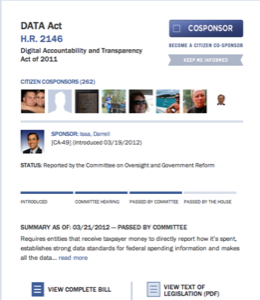House Majority Leader Eric Cantor, R-Va., launched the Citizen Cosponsor Project Tuesday, a Facebook-based platform he says will allow citizens to keep track of legislation currently before Congress. Log onto the site, review legislation and, if you support it, you can click “co-sponsor” and get updates on the status of the legislation as it works its way through Congress.

Which is all well and good, providing you only care about the six pieces of legislation that Cantor cares about.
In an introductory video and in text on the Web site, Cantor says the initiative will foster a “more open, visible and participatory legislative process.” The site refers to “we,” implying a bipartisan effort, but as Marci Harris points out on Huffington Post, the site never makes clear who “we” are.
But here’s the real rub: five of the six pieces of legislation on the site are sponsored by Republicans. And the one sponsored by Rep. Al Green, D-Texas, is a rather innocuous Homes For Heroes Act ensuring access to HUD housing and homeless programs for veterans.
The other bills range from repealing portions of the Obama administration’s healthcare reform legislation to the Permanent Hyde Rule, which Republicans are calling the No Taxpayer Funding for Abortion Act.

All of this leaves us asking why not use the publicly available data on all pending legislation and allow citizens to “co-sponsor” any bill currently being weighed by the legislature?
No matter how we feel about Facebook’s privacy provisions, we’ll be the first to admit that it is the default way to connect with people these ways. We’re not poo-poohing any initiative that harnesses social media that makes it easier for people to get involved in the political process, and we’re not bashing this from a partisan point of view. We’re bashing it from a point of view that cares about transparency.
Cantor’s ploy reeks of partisanship disguised as bipartisanship (nowhere on the main page of the site are the words “Democrat” or “Republican” used). And while the Cosponsor Project may be more participatory, it’s certainly not the “open, visible” platform he promises in his introduction.

















